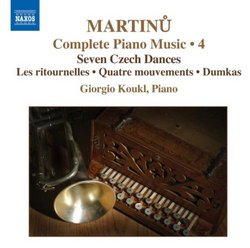| All Artists: Bohuslav Martinu, Giorgio Koukl Title: Martinu: Complete Piano Music, Vol. 4 Members Wishing: 0 Total Copies: 0 Label: Naxos Original Release Date: 1/1/2007 Re-Release Date: 12/11/2007 Genres: Dance & Electronic, Classical Styles: Ballets & Dances, Dances, Chamber Music, Forms & Genres, Short Forms, Historical Periods, Classical (c.1770-1830), Instruments, Keyboard Number of Discs: 1 SwapaCD Credits: 1 UPC: 747313021574 |
Search - Bohuslav Martinu, Giorgio Koukl :: Martinu: Complete Piano Music, Vol. 4
 | Bohuslav Martinu, Giorgio Koukl Martinu: Complete Piano Music, Vol. 4 Genres: Dance & Electronic, Classical
|
Larger Image |
CD Details |
CD ReviewsDelightful Martinu Miniatures J Scott Morrison | Middlebury VT, USA | 12/30/2007 (5 out of 5 stars) "With this issue, Volume 4 in the series, we come to the end of the complete traversal of Bohuslav Martinu's piano music by Czech-Swiss pianist Giorgio Koukl. I've reviewed the three previous issues positively: Martinu: Complete Piano Music, Vol. 1, Martinu: Complete Piano Music, Vol. 2, and Martinu: Complete Piano Music, Vol. 3. I particularly liked Vol. 3 because it contained two rather more substantial pieces. Here, with this volume, we are back in the realm, primarily, of miniatures; no single piece lasts longer than about five minutes (and the longest one, 'Rujana', at 5:23, is a world-premiere performance and recording).
There is not a single weak piece among the 38 included here. I was particularly taken by the first of the 'Seven Czech Dances' (and spent an unconscionable time trying to figure out the metrical complexities in this basically 2/4 piece). It is a polka, but not like any you've ever heard before with its Czech harmonies, Stravinskyan rhythms and French insouciance. Its six fellow dances are just as delightful. I chuckled at the title of 'Procession of the Cats on Solstice Night', having myself just come from a winter solstice celebration; one can picture cats walking with their wonted hauteur and delicacy. Another humorously titled piece is 'Instructive Duo for the Nervous', which pits the pianist's two hands against each other. 'Rujana' is a tone-poem depicting the chalk cliffs of the German island, Rügen, located in the Baltic Sea, and the sea surrounding it. ('Rujana' is the Czech form of the German 'Rügen'.) The music is rather starker and more dramatic than anything else on this disc; the booklet does not explain why this effective work had never been played or recorded before. Four of the pieces come from the period after Martinu moved to America: 'Mazurka' ("Homage to Paderewski"), 'Bagatelle', 'Barcarolle' and 'Improvisation'; unlike some of his other American works, these do not seem particularly American in tone, but all are delightful. Most of the pieces included here have that sassy French quality that Martinu so often conveyed. Of somewhat greater substance, but charming for all that, are the six 'Les ritournelles' (championed by Martinu's friend, the great Czech pianist Rudolf Firkusný) and 'Quatre mouvements'. All the music here is determinedly tonal, much of it is colored by French sensibility and elements of early American jazz, and all of it is played with élan by Koukl, who clearly has taken Martinu's music to his heart. Recommended. Scott Morrison" |

 Track Listings (38) - Disc #1
Track Listings (38) - Disc #1